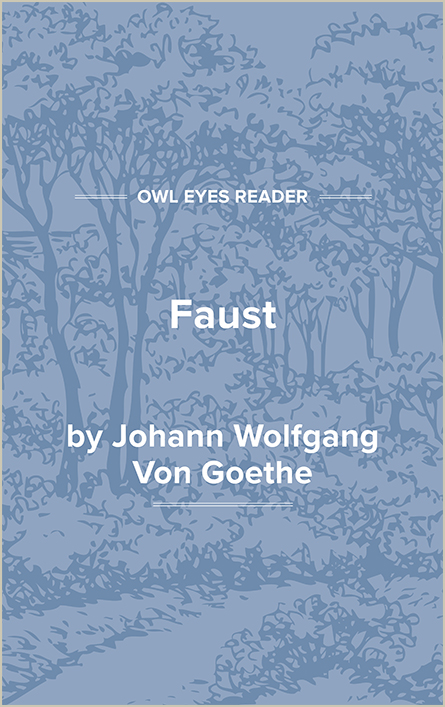Summary
Goethe began his most famous work, Faust, while he was in his twenties. He published the first part of Faust in 1808 and completed the second part two months before his death. The Faust story is based on the legend of the Renaissance scholar Dr. Faustus, who quested after universal knowledge by means of alchemy and magic. The real Johannes Faustus lived from 1480 to 1540. His legendary adventures became the subject for innumerable puppet shows and popular folk dramas throughout the seventeenth and eighteenth centuries in Germany. Thus, Goethe was familiar with the Faust myth since childhood, and from the time that he was twenty, until he died at eighty-two, the theme never left his imagination.
The theme of Goethe’s Faust befits both the Romantic fascination with the supernatural and the themes of justice and good and evil, which have occupied literature since biblical times. Goethe takes the theme of good and evil beyond the traditional Christian concept embodied in God and the Devil. Influenced by the study of Oriental literature, Goethe sees the world as a totality composed of opposing forces: light and dark, good and evil, male and female, yin and yang, physical and spiritual, natural and supernatural. God and the Devil (whom Goethe calls Mephistopheles, which means “without light”) are representative of these opposing forces on a larger, as well as a smaller, scale: within the macrocosm (the universe) and the microcosm (humanity). There exists on all levels a constant struggle between the opposing forces, with each side striving to overcome the other. It is this striving that is key to the understanding of Goethe’s work. The redeeming factor of Faust is that he continues to strive. To Goethe, the ideal man, the Faustian man, never gives up striving.
The story of the Faust drama (sometimes referred to as the Gretchen tragedy) begins in Heaven. In “The Prologue in Heaven”—a modern enactment of the Job story—the Devil, Mephistopheles, complains that God’s creation, man, is so pitiful and corrupt that it is no more fun to torture him. God asks Mephistopheles if he knows the good man Faust. The Devil laughs and offers God a bet: “What do you wager? You will lose him yet.” God accepts Mephistopheles’ bet for Faust’s soul and points out that as long as man strives, he will make mistakes, but that he is basically good.
Despite Mephistopheles’ gleefully wicked intent to make Faust “eat dust” like his cousin the Snake, God tells Mephistopheles that He never hated him or those like him, but instead, he considers him necessary to provoke humankind to action. These lines embody the key to understanding the theme of the Faust story and the Faustian striving:
I have never hated the likes of you.Of all the spirits of denialThe joker is the last that I eschew.Man finds relaxation too attractive—Too fond too soon of unconditional rest;Which is why I am pleased to give him a companionWho lures and thrusts and must, as devil, be active.
Goethe depicts the Devil not as the customary embodiment of fear-filled threat and wickedness but rather as a jovial but serious mischief maker. When the curtain closes after the prologue and Mephistopheles is left alone on stage, he humorously observes that God is not all that bad, saying, “I like to see the Old One now and then.”
The first part of the tragedy begins with Faust alone in his study. Dr. Faust is a professor, doctor, lawyer, and theologian. He has studied all that there is to study but bemoans the fact that he still knows nothing. He teaches, but he feels that he is merely leading his students by the nose, since they could read for themselves and know all that he knows. He would like to be able to teach something that would improve humankind.
There is one subject, though, of which Faust knows virtually nothing: the world of the spirits. He opens a book on mystic art by Nostradamus and sees the sign of the Macrocosm and then of the Earth Spirit. Inspired to venture into...
(The entire page is 1,979 words.)
Owl Eyes subscribers get unlimited access to our expert annotations, analyses, and study guides on your favorite texts. Master the classics for less than $5/month!

